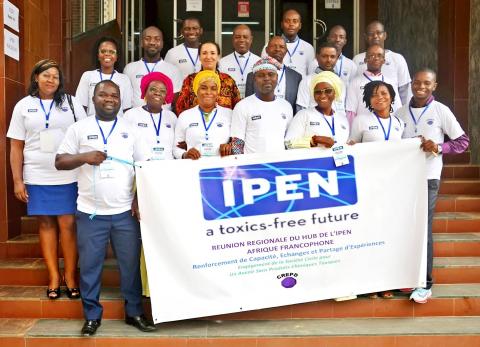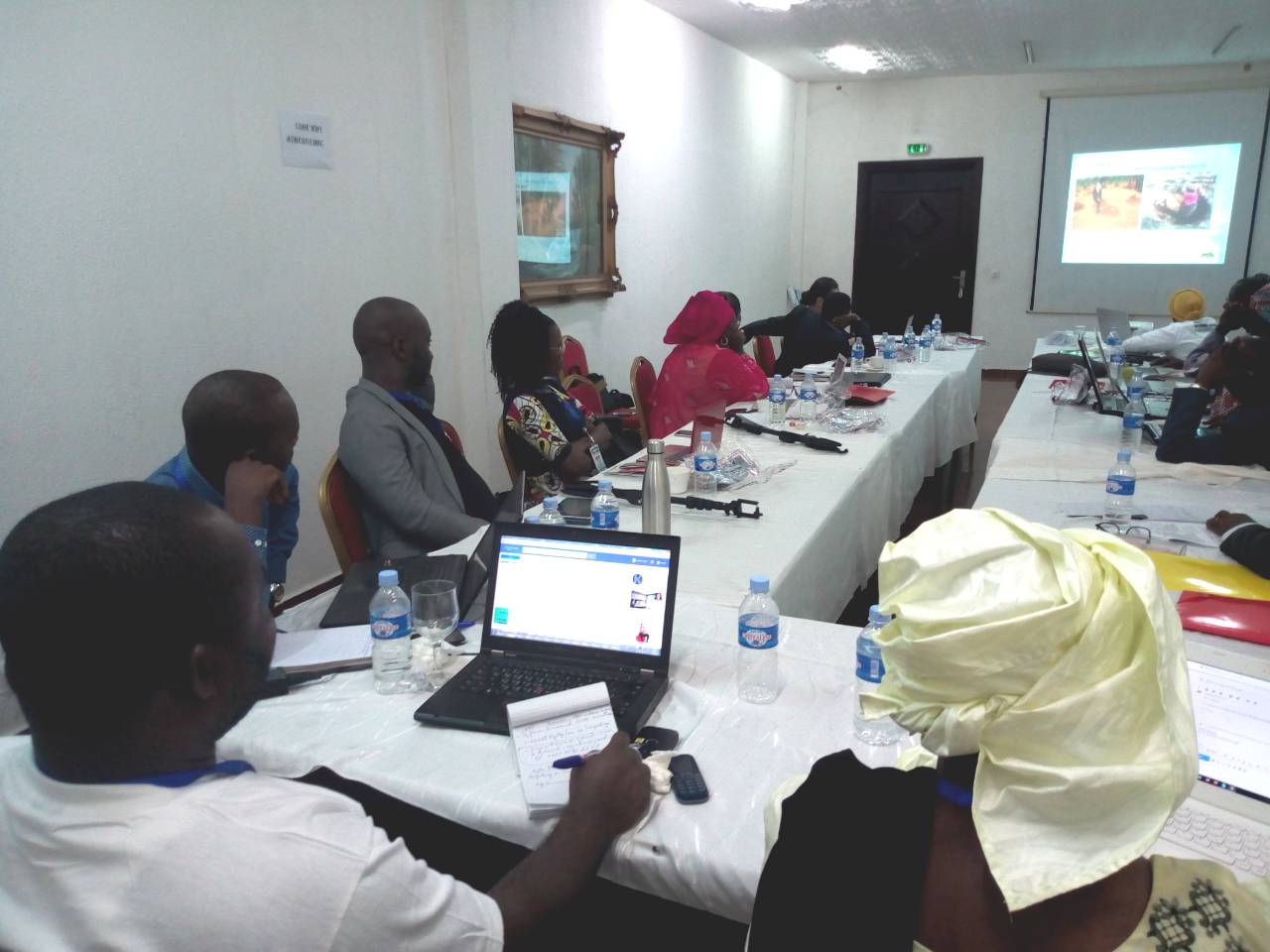IPEN Francophone Africa Regional Meeting

(Version française: Rapport de la réunion régionale IPEN Afrique francophone)
The IPEN Francophone Africa Hub, Centre de Recherche et d’Education pour le Développement (CREPD) organized its second regional meeting from the 30thto 31stMay 2019 in Abidjan, Côte d'Ivoire. The last Francophone Africa Regional meeting took place in Yaoundé, Cameroon in December 2016. This meeting was an opportunity to share experiences and build the capacities of Participating Organizations (POs). The meeting was attended by POs from the Francophone Africa region, the Regional Coordinators of the Anglophone Africa and North Africa & Middle East hubs, and an IPEN Co-Chair.
Organizations attending represented 10 countries: Senegal, Mali, Benin, Togo, Côte d'Ivoire, Cameroon, The Democratic Republic of Congo, Togo, Tunisia, Tanzania and Ethiopia. They shared information about their local and national experiences, their work with IPEN, and proposed regional priorities, including an approach and strategy for implementation.
A total of 20 participants, including the SGP/GEF national coordinator from Côte d'Ivoire, attended the meeting. The main goal of the meeting was to strengthen the capacities of IPEN Participating Organizations (POs) in French-speaking Africa in their various initiatives for a better approach and methodology against toxic chemicals, and to further promote the implementation of the Stockholm, Minamata, Basel, Rotterdam and Bamako Conventions, as well as the Strategic Approach to International Chemicals Management (SAICM).
The various group work sessions made it possible to define the priorities of the IPEN Francophone Africa Region. Three main issues were identified by the participants as national priorities. These are:
- Awareness-raising and capacity-building of institutions and populations on the dangers of pesticides, mercury and chemicals in products;
- Awareness-raising and promotion of alternatives to Highly Hazardous Pesticides and POPs pesticides; and
- Awareness-raising and promotion of ecological alternatives to the use of mercury in small-scale gold mining.
To achieve this, the methodology or approach to be adopted has been broken down as follows:
- Generate regional or local data on these issues;
- Conduct more awareness-raising activities on pollution issues from pesticides and mercury, and possibly hold physical and/or virtual meetings with POs at the national or regional level to share experiences;
- Look for cleaner alternatives to mercury and pesticides;
- Promote the sharing and use of experiences at the regional level; and
- Develop a guide for the promotion of good environmental practices, with the aim of reducing and phasing out harmful chemicals, including pesticides, mercury compounds, and lead compounds in paint.
Participants in this meeting expressed their gratitude for the ability to come together and meet in person. The meeting not only allowed colleagues in the region to share and gain experiences on a number of issues, but also, and above all, to forge fruitful relationships and see the willingness they all had to help each other implement local campaigns and activities with the larger goal of better regional management of chemicals.
List of Presentations provided:
- Overview of the Bamako Convention by AVPIP - Mali
- Role of communication in the successful implementation of projects by AFRIGRES - DR of Congo
- IPEN and Sustainable Development Goals by CREPD - Cameroon
- Construction of the San Pedro Coal-fired Power Plant (Côte d'Ivoire) and Mercury Emissions by JVE - Côte d'Ivoire
- Support for PO activities in chemicals management at the national or regional levels by CASE - Côte d’Ivoire
- Consumer Mobilization for Food Security and the Environment: a response to the use of hazardous pesticides in agriculture in Senegal by ADEC - Senegal
- The Fight Against the Excessive and Inappropriate use of Highly Hazardous Pesticides (HHPs) and POPs pesticides in the Agro-industrial Zones of Cameroon by FADENAH - Cameroon
- Nano Technologies and Nanomaterials in Togo by Welfare Togo
- Chrysotile Asbestos Pollution in Urban Habitats and African Agglomerations: Impacts on the Environment and Human Health by CASE - Côte d’Ivoire
- Promotion of Alternatives to POPs pesticides: Case of Capacity Building of Togolese Producers on the Harmful Effects of Agricultural Chemical Inputs and Mobilization in Favor of Ecological Alternatives by Amis de la Terre Togo
- Reduction of PCBs in Cameroon Through the use of Local Expertise and Capacity Building at the National Level by CREPD - Cameroon
- The Need for Developing Countries to Advocate for the Adoption of Low-POPs content products (LPCL): the case of Côte d'Ivoire by CASE - Côte d’Ivoire
- Plastics’ Toxic Liabilities:Invisible Ocean Pollutants & Additives to Plastic by CREPD - Cameroon
- Chemical Safety and the 2030 Agenda by AEEFG - Tunisia
- Analysis Related to the use of Mercury in Gold Mining in Niger by AVD Kowa Murna - Niger
- Resource Mobilization following 8 Steps by CREPD - Cameroon
- Electronic Waste in Côte d'Ivoire: Challenges and Prospects for 2020 by JVE - Côte d’Ivoire
- Elimination of Lead Paints in Togo: Efforts Made by Les Amis de la Terre du Togo to Eliminate Lead Paint at the National Level by Les Amis de la Terre du Togo
- Reduction and Elimination of Mercury Use and its Compounds in Small-scale Gold Mining Activities by - Carbone Guinée
- The Situation in the Fight Against Dental Mercury in The Ivory Coast by CASE
- SGP/GEF operational strategy (FEM 7) by GEF/SGP - Côte d’Ivoire
- An Experiment on the Biological Alternatives to Pesticides Learnt During a Campaign Carried out in the South of Ivory Coast (The Horticultural Project of Azaguié) by GEF/SGP - Côte d’Ivoire.

